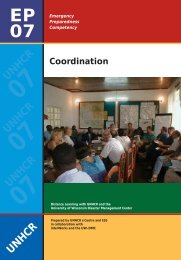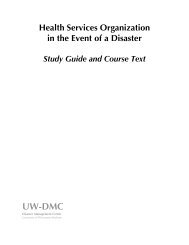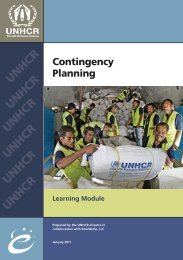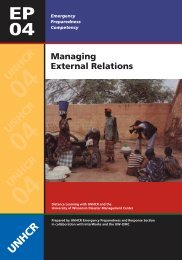Natural Hazards: Causes and Effects - Disaster Management Center ...
Natural Hazards: Causes and Effects - Disaster Management Center ...
Natural Hazards: Causes and Effects - Disaster Management Center ...
Create successful ePaper yourself
Turn your PDF publications into a flip-book with our unique Google optimized e-Paper software.
In all emergency activities it is of prime importance that information for the public about what<br />
they should do <strong>and</strong> where they can go for services be immediately available <strong>and</strong> accurate, <strong>and</strong><br />
that decision-makers act according to priorities.<br />
Earthquake Rehabilitation, Reconstruction <strong>and</strong> Recovery<br />
At the end of the emergency period, a transition to long-term recovery occurs. Local authorities<br />
should concentrate their assistance in the following areas:<br />
• repair <strong>and</strong> reconstruction of “lifelines,” i.e. water, sewer, electrical services <strong>and</strong> roads;<br />
• technical, material <strong>and</strong> financial assistance for the repair <strong>and</strong> reconstruction of housing <strong>and</strong><br />
public buildings;<br />
• economic programs that create jobs to help rejuvenate the economy;<br />
• financial assistance to survivors, including lines of credit <strong>and</strong> assistance to businesses,<br />
enabling them to participate in recovery efforts.<br />
Internal donors will be able to provide assistance in all of these same activities. The most costeffective<br />
support they can provide is technical <strong>and</strong> financial assistance. 16<br />
Myths <strong>and</strong> Lessons from Past <strong>Disaster</strong>s<br />
The study of geology, specifically the nature <strong>and</strong> causes of earthquakes, has been relatively<br />
recent. It is, therefore, underst<strong>and</strong>able that people throughout history have created their own<br />
explanations for the occurrence of earthquakes.<br />
Frequently, traditional cultures believe that earthquakes are caused by a god. They believe<br />
their god uses an earthquake to express displeasure for some fault or sin of the community.<br />
Other people claim there is a correlation between earthquakes <strong>and</strong> weather patterns. More<br />
current speculation has suggested that the explosion of nuclear bombs provokes earthquakes.<br />
These misconceptions, in turn, affect what people think they can do about earthquakes. For<br />
example, they may simply resign themselves to suffer the “act of God” if that is God’s intention.<br />
Examining past earthquakes has, of course, demonstrated many lessons:<br />
• Because people often assume there is nothing they can do to avoid the impact or destruction<br />
of an earthquake, there is a tendency for survivors to reconstruct buildings in the same<br />
manner (<strong>and</strong> with the same degree of danger) as the pre-disaster buildings.<br />
• Designs that affect reconstruction planning are usually made in the first month following the<br />
earthquake. This means that technical assistance <strong>and</strong> improvements must be provided soon<br />
after the quake in order to have an effect.<br />
• Most survivors will build an emergency shelter from the rubble of their house. They prefer<br />
these shelters to tents because the makeshift houses provide more protection <strong>and</strong> serve as a<br />
means of protecting recoverable building materials.<br />
• Earthquakes <strong>and</strong> the threat of continuing tremors rarely are sufficient reason to evacuate an<br />
affected area.<br />
• Health threats in the aftermath are grossly exaggerated. Communicable diseases almost<br />
never “break out” unless people are forced to evacuate an area <strong>and</strong> move into camps.<br />
• Reconstruction always takes longer than estimated. Full recovery may take 10 years or<br />
more.<br />
Earth scientists are placing a high priority on earthquake prediction. They are even<br />
investigating methods of earthquake prevention. In the meantime it is the disaster manager’s<br />
role to implement programs that will avoid human <strong>and</strong> property losses from earthquakes or to<br />
minimize their impact when they do strike.








